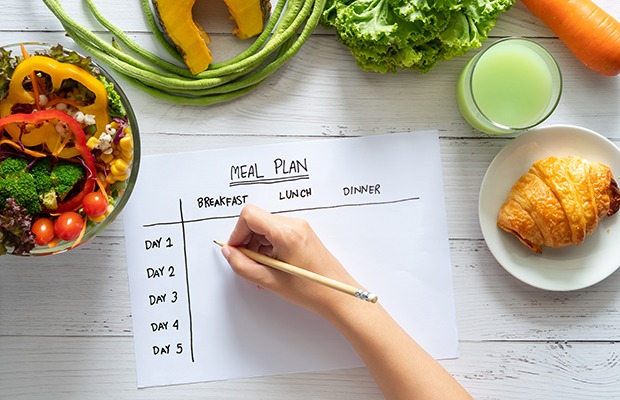Losing weight can be a challenging task, but with the right diet plan, it can be made easier. A well-balanced diet that includes a variety of nutrient-dense foods is essential for weight loss and overall health.
In this blog, Graana.com will discuss a Pakistani diet plan for weight loss based on whole, unprocessed foods that will help you reach your weight loss goals in a healthy and sustainable way.
Diet Tips for Weight Loss
Following are some of the tips for reducing your weight and improving your overall health.
Preparing Fresh Meals

Preparing fresh meals is an essential part of a weight-loss diet plan. Cooking your own meals allows you to control the ingredients that go into your food, ensuring that you are consuming healthy, whole foods. It also allows you to control the portion sizes of your meals, which can help reduce your calorie intake.
Additionally, cooking your own meals can be a fun and rewarding experience, as you can experiment with different flavours and ingredients.
Include All Food Groups
A well-balanced diet that includes a variety of nutrient-dense foods is essential for weight loss and overall health. It is important to include all food groups in your diet plan, including fruits and vegetables, whole grains, lean proteins, and healthy fats.
Each food group provides essential nutrients that are vital for weight loss and overall health. For example, there are different fruits and vegetables that are low in calories, high in fibre, and packed with essential vitamins and minerals. At the same time, whole grains provide energy for the body and are important for overall health.
Wholesome and Hearty Breakfast

Eating a wholesome and hearty breakfast is essential for weight loss. A good breakfast should include a mix of protein, healthy fats, and complex carbohydrates to keep you full and satisfied until lunch. A good example of a wholesome breakfast is oatmeal with almond milk, topped with fresh berries and a drizzle of honey, or a spinach and feta omelette with whole-grain toast.
Try taking your breakfast within 20 minutes of waking up, as eating breakfast soon after waking up is important for weight loss as it helps kickstart your metabolism so that your body can start burning calories immediately.
Additionally, if you skip breakfast or eat it too late, you may be more likely to overeat later in the day. It’s also important to note that our body is in a fasting state after 7-8 hours of sleep, so breaking the fast with a healthy breakfast is crucial for the body to function well.
Moderate Lunch
Having a moderate lunch is an important part of a Pakistani diet plan for weight loss. A moderate lunch should include a mix of protein, healthy fats, and complex carbohydrates to keep you full and satisfied until dinner.
A good example of a moderate lunch is lentils, a vegetable salad, curd with roti, or chickpeas. Having a moderate lunch is important to keep your energy levels stable throughout the day.
Light Dinner
A light dinner is essential to a weight loss diet plan. A light dinner should include a small portion of protein and healthy fats, such as lentils with a spoon or one kabab with brown bread. Eating a light dinner can help reduce your calorie intake and prevent overeating at night.
It’s also important to have your dinner at least 3 hours before you sleep, as this allows your body to digest the food and minimise any discomfort properly.
Mini-meals

Mini-meals, or snacks, can be an important part of a weight loss diet plan. They can help keep your energy levels stable throughout the day, preventing overeating during meals.
Good examples of mini-meals include fruits and nuts. These snacks are nutrient-dense, low in calories, and can help reduce your calorie intake.
Water
Water is an essential part of a balanced diet. It helps keep you full and satisfied, which can help in reducing your calorie intake. Drinking water also helps flush toxins out of the body and keep your skin healthy. Aim to drink at least 8 cups of water per day to stay hydrated and support weight loss.
Avoid Starvation or Zero Carb Diets
Avoiding starvation or a zero-carb diet for weight loss is crucial for both short-term and long-term health. Starvation or zero-carb diets can lead to nutrient deficiencies and be hard to stick to long-term.
Additionally, these types of diets can cause your metabolism to slow down, making it harder to lose weight and keep it off in the long term. Instead, focus on a well-balanced diet that includes a variety of nutrient-dense foods and aims to reduce your calorie intake in a healthy and sustainable way.
Conclusion
To sum it up, a weight loss diet plan should include a variety of nutrient-dense foods and should focus on fresh, whole foods. Meal preparation, including all food groups, a healthy breakfast, moderate lunch, and light dinner, can help reduce calorie intake and promote weight loss.
Additionally, consuming mini-meals, staying hydrated, and avoiding starvation or zero-carb diets are all key components of a healthy weight loss plan. Remember, losing weight should be a gradual process, and don’t be hard on yourself if you slip up; just keep pushing, and you’ll reach your goal.
To know more about the ways to lose weight through different diets, visit Graana blog.
FAQs
How to lose 15 kg in a month diet?
Losing 15 kg in a month is an ambitious goal and not recommended for healthy and sustainable weight loss. Rapid weight loss can be detrimental to your health and may result in muscle loss and nutritional deficiencies. It is advised to aim for a gradual and safe weight loss of 0.5-1 kg per week.
This can be achieved by creating a calorie deficit through a balanced diet and regular exercise. Consult a healthcare professional or a registered dietitian for personalized guidance.
How to lose 7 kgs in 15 days?
Losing 7 kg in just 15 days is an extremely aggressive weight loss target that may not be feasible or healthy. Rapid weight loss of this magnitude can put a strain on your body and lead to various health issues.
It is recommended to prioritize a sustainable approach to weight loss through a combination of a balanced diet, regular physical activity, and healthy lifestyle habits. Aim for a gradual weight loss of 0.5-1 kg per week for long-term success.
How to lose weight in Pakistan?
To lose weight in Pakistan, you can follow these general guidelines:
Focus on a balanced diet that includes a variety of fruits, vegetables, whole grains, lean proteins, and healthy fats.
Limit the consumption of sugary drinks, processed foods, and snacks high in calories and low in nutritional value.
Incorporate regular physical activity into your routine, such as walking, jogging, cycling, or joining fitness classes.
Drink plenty of water to stay hydrated and help control appetite.
Get sufficient sleep and manage stress levels as they can impact weight management.
Consider seeking guidance from a registered dietitian or nutritionist who can provide personalized advice based on your cultural preferences and dietary habits.
How to lose 10 kgs in 30 days diet plan?
Losing 10 kg in just 30 days is an aggressive and challenging goal. It is important to prioritize your health and focus on sustainable weight loss practices. Here are some general guidelines:
Create a calorie deficit by reducing your calorie intake through a balanced diet and portion control.
Include a variety of nutrient-rich foods in your diet, emphasizing fruits, vegetables, whole grains, lean proteins, and healthy fats.
Avoid or limit sugary and processed foods that are high in calories and low in nutritional value.
Incorporate regular physical activity into your routine, including both cardiovascular exercises and strength training.
Stay hydrated by drinking an adequate amount of water throughout the day.
Monitor your progress, adjust your plan as needed, and seek guidance from a healthcare professional or registered dietitian for personalized advice.
Remember, individual results may vary, and it’s important to consult a healthcare professional or registered dietitian before making significant changes to your diet or exercise routine. They can provide personalized guidance based on your specific needs, health conditions, and cultural preferences.




